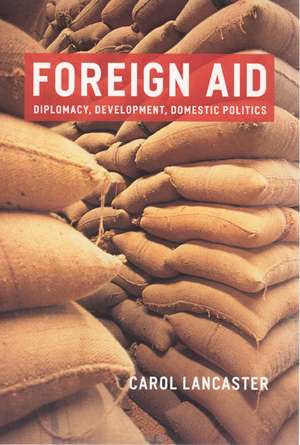Foreign Aid: Diplomacy, Development, Domestic Politics
Autor Carol Lancasteren Limba Engleză Paperback – 7 dec 2006
A twentieth-century innovation, foreign aid has become a familiar and even expected element in international relations. But scholars and government officials continue to debate why countries provide it: some claim that it is primarily a tool of diplomacy, some argue that it is largely intended to support development in poor countries, and still others point out its myriad newer uses. Carol Lancaster effectively puts this dispute to rest here by providing the most comprehensive answer yet to the question of why governments give foreign aid. She argues that because of domestic politics in aid-giving countries, it has always been—and will continue to be—used to achieve a mixture of different goals.
Drawing on her expertise in both comparative politics and international relations and on her experience as a former public official, Lancaster provides five in-depth case studies—the United States, Japan, France, Germany, and Denmark—that demonstrate how domestic politics and international pressures combine to shape how and why donor governments give aid. In doing so, she explores the impact on foreign aid of political institutions, interest groups, and the ways governments organize their giving. Her findings provide essential insight for scholars of international relations and comparative politics, as well as anyone involved with foreign aid or foreign policy.
Drawing on her expertise in both comparative politics and international relations and on her experience as a former public official, Lancaster provides five in-depth case studies—the United States, Japan, France, Germany, and Denmark—that demonstrate how domestic politics and international pressures combine to shape how and why donor governments give aid. In doing so, she explores the impact on foreign aid of political institutions, interest groups, and the ways governments organize their giving. Her findings provide essential insight for scholars of international relations and comparative politics, as well as anyone involved with foreign aid or foreign policy.
Preț: 226.67 lei
Nou
Puncte Express: 340
Preț estimativ în valută:
43.38€ • 44.81$ • 36.10£
43.38€ • 44.81$ • 36.10£
Carte tipărită la comandă
Livrare economică 25 martie-08 aprilie
Preluare comenzi: 021 569.72.76
Specificații
ISBN-13: 9780226470450
ISBN-10: 0226470458
Pagini: 288
Ilustrații: 25 line drawings, 6 tables
Dimensiuni: 152 x 229 x 30 mm
Greutate: 0.39 kg
Editura: University of Chicago Press
Colecția University of Chicago Press
ISBN-10: 0226470458
Pagini: 288
Ilustrații: 25 line drawings, 6 tables
Dimensiuni: 152 x 229 x 30 mm
Greutate: 0.39 kg
Editura: University of Chicago Press
Colecția University of Chicago Press
Notă biografică
Carol Lancaster is associate professor in the Edmund A. Waslh School of Foreign Service at Georgetown University and director of the Mortara Center for International Studies. She is the author of Aid to Africa, also published by the University of Chicago Press, a coauthor of Organizing U.S. Foreign Aid: Confronting the Challenges of the Twenty-First Century, and a former deputy administrator of USAID.
Cuprins
Preface
1 Why Foreign Aid? Setting the Stage
2 Aid’s Purposes: A Brief History
3 The United States: Morgenthau’s Puzzle
4 Japan: The Rise and Decline of an “Aid Superpower”
5 France: Rang et Rayonnement
6 Germany: A “Middle of the Roader”
7 Denmark: The Humane Internationalist
8 Conclusions and Conjectures
Interviews
Abbreviations, Acronyms, and Foreign Terms
Notes
Index
1 Why Foreign Aid? Setting the Stage
2 Aid’s Purposes: A Brief History
3 The United States: Morgenthau’s Puzzle
4 Japan: The Rise and Decline of an “Aid Superpower”
5 France: Rang et Rayonnement
6 Germany: A “Middle of the Roader”
7 Denmark: The Humane Internationalist
8 Conclusions and Conjectures
Interviews
Abbreviations, Acronyms, and Foreign Terms
Notes
Index
